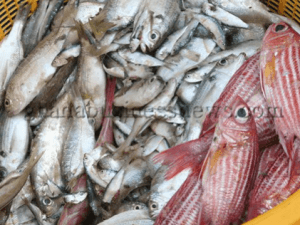Ghana loses $10m annually through transshipment
 Madam Hanny Sherry Ayittey, the Minister of Fisheries and Aquaculture Development, says the country loses $10 million annually through transshipment on the country’s territorial waters.
Madam Hanny Sherry Ayittey, the Minister of Fisheries and Aquaculture Development, says the country loses $10 million annually through transshipment on the country’s territorial waters.
he added that the African continent also loses $30 million through the illegal practice every year.
Meanwhile the Fisheries Amendment Act 2014, Act 880, had prescribed stiffer punishment for offenders with a fine from $1 – $4million.
Transshipment is an illegal transaction where large foreign fishing vessels sell fishes or cargoes to Ghanaian vessels, boats and canoes at sea, and in this way, refuse to berth at the authorised ports and also evade payment of taxes to the government.
Madam Ayittey made this known at a stakeholders meeting held at the Regional Coordinating Council in Sekondi, at the start of a four-day tour of the Western Region.
The meeting brought together personnel of the Fisheries Enforcement Unit comprising the Ghana Navy, the Marine Police, the Fisheries Commission as well as some non-governmental organisations and the media.
They discussed issues affecting the fisheries sector and the maritime industry.
She urged the stakeholders to work as a team for sustainable fisheries management, stressing:”Every agency has a vital role to play in ensuring harmonious fisheries management”.
“We have a common goal thus, to protect the sea from pollution and exploitation in view of its economic importance. There are fish stock, gas and oil resources which are crucial for the country’s economic growth, industries and individuals as well”, she said.
The Minister said pair trawling has been outlawed by the fisheries Regulation 2010, LI 1968, and, therefore, asked the fisheries taskforce to enforce the ban.
She observed that there are monitoring systems for tracking all vessels within the country’s territorial waters and beyond.
The Ghana Marine Authority has a vessel tracking management system report, which monitors the oil buffer zones and ensures maritime security.
The Ministry has developed a five-year Fisheries Management Plan, to ensure better fisheries management; therefore, there would be a three-month closed fishing season so that large fishing vessels would not fish from January – February every year.
The Ministry is also in discussion with the artisanal fishermen to find a suitable period for off-fishing activities.
This would enable the fingerlings to grow, and also serve as a preventive measure against depletion of the fish stock.
Madam Ayittey said: “The closed fishing season would save the country from 20-30 per cent of the fish stock.”
She said Ghana had signed International Treaties that enjoins it, to comply with the fisheries regulations.
She said issues about the oceans are of international concern since fish could migrate from one place to another without restrictions.
The Flag Officer Commanding the Western and Eastern Naval Commands, Commodore Mark Ransford Nana Banyin Yawson asked stakeholders in the fisheries sector to share information in order to fight against illegal fishing activities.
He warned fishermen who are still fishing close to the oil rigs on the Jubilee Oilfield to stay away to avoid a brush with the law.
The stakeholders raised red flag over the enforcement of the fisheries law because some illegal fishing operators arrested by the fisheries taskforce have escaped prosecution because of political interference.
They also expressed concern about the frequent flooding of the coastal communities by sea weeds (algae blue), which disrupt fishing activities, as well as poor sanitation at the coastline and light fishing.
Source: GNA
